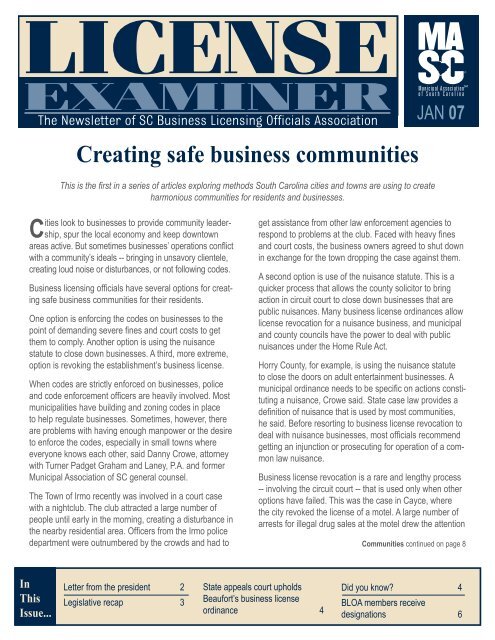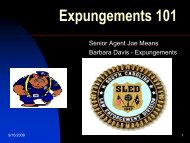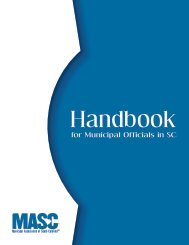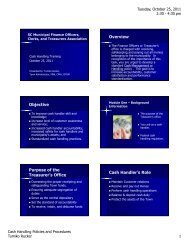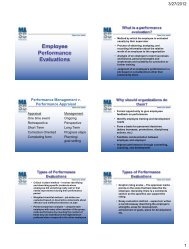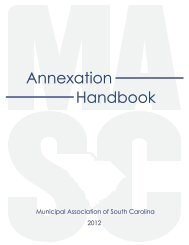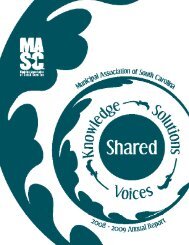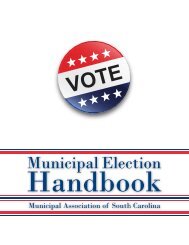January - Municipal Association of South Carolina
January - Municipal Association of South Carolina
January - Municipal Association of South Carolina
Create successful ePaper yourself
Turn your PDF publications into a flip-book with our unique Google optimized e-Paper software.
Creating safe business communities<br />
This is the first in a series <strong>of</strong> articles exploring methods <strong>South</strong> <strong>Carolina</strong> cities and towns are using to create<br />
harmonious communities for residents and businesses.<br />
Cities look to businesses to provide community leadership,<br />
spur the local economy and keep downtown<br />
areas active. But sometimes businesses’ operations conflict<br />
with a community’s ideals -- bringing in unsavory clientele,<br />
creating loud noise or disturbances, or not following codes.<br />
Business licensing <strong>of</strong>ficials have several options for creating<br />
safe business communities for their residents.<br />
One option is enforcing the codes on businesses to the<br />
point <strong>of</strong> demanding severe fines and court costs to get<br />
them to comply. Another option is using the nuisance<br />
statute to close down businesses. A third, more extreme,<br />
option is revoking the establishment’s business license.<br />
When codes are strictly enforced on businesses, police<br />
and code enforcement <strong>of</strong>ficers are heavily involved. Most<br />
municipalities have building and zoning codes in place<br />
to help regulate businesses. Sometimes, however, there<br />
are problems with having enough manpower or the desire<br />
to enforce the codes, especially in small towns where<br />
everyone knows each other, said Danny Crowe, attorney<br />
with Turner Padget Graham and Laney, P.A. and former<br />
<strong>Municipal</strong> <strong>Association</strong> <strong>of</strong> SC general counsel.<br />
The Town <strong>of</strong> Irmo recently was involved in a court case<br />
with a nightclub. The club attracted a large number <strong>of</strong><br />
people until early in the morning, creating a disturbance in<br />
the nearby residential area. Officers from the Irmo police<br />
department were outnumbered by the crowds and had to<br />
JAN 07<br />
get assistance from other law enforcement agencies to<br />
respond to problems at the club. Faced with heavy fines<br />
and court costs, the business owners agreed to shut down<br />
in exchange for the town dropping the case against them.<br />
A second option is use <strong>of</strong> the nuisance statute. This is a<br />
quicker process that allows the county solicitor to bring<br />
action in circuit court to close down businesses that are<br />
public nuisances. Many business license ordinances allow<br />
license revocation for a nuisance business, and municipal<br />
and county councils have the power to deal with public<br />
nuisances under the Home Rule Act.<br />
Horry County, for example, is using the nuisance statute<br />
to close the doors on adult entertainment businesses. A<br />
municipal ordinance needs to be specific on actions constituting<br />
a nuisance, Crowe said. State case law provides a<br />
definition <strong>of</strong> nuisance that is used by most communities,<br />
he said. Before resorting to business license revocation to<br />
deal with nuisance businesses, most <strong>of</strong>ficials recommend<br />
getting an injunction or prosecuting for operation <strong>of</strong> a common<br />
law nuisance.<br />
Business license revocation is a rare and lengthy process<br />
-- involving the circuit court -- that is used only when other<br />
options have failed. This was the case in Cayce, where<br />
the city revoked the license <strong>of</strong> a motel. A large number <strong>of</strong><br />
arrests for illegal drug sales at the motel drew the attention<br />
Communities continued on page 8<br />
In<br />
This<br />
Issue...<br />
Letter from the president 2<br />
Legislative recap 3<br />
State appeals court upholds<br />
Beaufort’s business license<br />
ordinance 4<br />
Did you know? 4<br />
BLOA members receive<br />
designations 6
Letter from the BLOA president<br />
This year BLOA celebrated its 20th year <strong>of</strong> providing outstanding training, advocacy,<br />
networking and pr<strong>of</strong>essional development for our members! We commemorated this<br />
milestone at the 2006 BLOA Annual Meeting in Hilton Head Island, SC. The meeting was<br />
a GREAT success. It takes a lot to orchestrate an annual meeting—site location, food<br />
to serve, training to teach, schedules to follow, not to mention a lot <strong>of</strong> behind the scenes<br />
work. There’s a lot that goes into it! But, the BLOA board and I had a great time planning<br />
and hosting it.<br />
At the 20th anniversary celebration, we recognized the pioneers—those individuals who<br />
have served us since BLOA’s inception. A photo <strong>of</strong> them preparing to serve the BLOA<br />
20th anniversary cake is featured below. We also recognized several BLOA groups for<br />
their hard work, dedication and achievements—some <strong>of</strong> which are highlighted on page 6. I want to personally thank<br />
and recognize the BLOA boards past and present, ABL/MBL committee, COG leaders, License Examiner newsletter<br />
committee, and all speakers for their hard work and dedication to this great association. Without them and you,<br />
BLOA would not exist.<br />
I also want to take the time to thank our membership for allowing me the privilege <strong>of</strong> serving as president <strong>of</strong> our<br />
association. As past presidents have stated, this is “Your Board and Your <strong>Association</strong>: Get Involved!” If you haven’t<br />
yet, I highly recommend you take that step beyond just being a member. Step out and lead a COG, teach a training<br />
class, accept a board position, and give ideas about the future <strong>of</strong> BLOA and the direction it takes. One <strong>of</strong> my main<br />
objectives during my presidency is to find some new faces and fresh ideas for all aspects <strong>of</strong> participation in the<br />
various areas <strong>of</strong> our association to ensure our continued progress in the future.<br />
There are various projects the board will be working on this year in an attempt to better the association and ensure it<br />
stays at the cutting edge for the future. Stay tuned, I will keep you updated in each edition <strong>of</strong> the License Examiner.<br />
If you have any concerns, questions or suggested topics, please don’t hesitate to contact me at 864.467.4504 or<br />
bowmanj@greatergreenville.com.<br />
Look out for membership renewals this month and become a member <strong>of</strong> BLOA. We have built a strong foundation<br />
… join us in building an even stronger future. Happy<br />
20th anniversary BLOA! I am looking forward to many more<br />
productive years to come!<br />
I wish you all a happy holiday season.<br />
Sincerely,<br />
Jeff Bowman, MBL<br />
City <strong>of</strong> Greenville<br />
2<br />
BLOA pioneers cut the 20th anniversary cake during the Annual Meeting.<br />
(L-R: Brenda Kyzer, MBL, MASC; Dianne Bitzer, MMC, City <strong>of</strong><br />
Clemson; Roy Bates, Attorney; GC Robinett <strong>of</strong> Columbia; Janet<br />
LaSchuma, MBL, City <strong>of</strong> Columbia and Betsy Richardson, MBL, City <strong>of</strong><br />
Greenville.)
Legislative recap <strong>of</strong> the 116th session<br />
<strong>of</strong> the SC General Assembly<br />
The General Assembly adjourned on June 1 to end its 116th Session. The following is a brief summary <strong>of</strong> the<br />
key legislative issues <strong>of</strong> interest to business license <strong>of</strong>ficials and other municipal <strong>of</strong>ficials.<br />
Taxicabs<br />
Legislation regarding certification <strong>of</strong> taxicabs was signed<br />
into law on April 5, 2006, and amended Section 58-23-<br />
1240. The law calls for a sticker or metal plate to be affixed<br />
to the rear <strong>of</strong> a taxi. The dimensions <strong>of</strong> the plate or sticker<br />
must be approved by the municipality where the taxi principally<br />
operates. The law eliminates<br />
the requirement to change<br />
the color <strong>of</strong> the sticker annually. A<br />
taxi owner who qualifies as a self<br />
insurer must issue to the taxi operator<br />
a certificate <strong>of</strong> insurance.<br />
The certificate must remain in the<br />
taxi while it is in operation.<br />
Property Tax Reform<br />
Property tax reform was a hot issue last session. After debate<br />
lasting the length <strong>of</strong> the session followed by a constitutional<br />
amendment vote in November, the final result was<br />
a sales tax/property tax swap and a limit on property value<br />
increases during reassessment years.<br />
The tax swap involves exchanging a reduction in the property<br />
tax for school operations for an increase in the sales<br />
tax. Any surplus revenues could replace property taxes<br />
on owner- occupied homes for county operations. While<br />
municipal governments are not directly affected by the<br />
sales tax/property tax revenue swap, the increase in sales<br />
tax will increase operation costs, and the millage rate limits<br />
will create additional pressures for finding other revenue<br />
sources to fund the municipal services required by the<br />
local citizens. Local governments and school districts are<br />
not allowed to increase their millage rates more than the<br />
previous year’s Consumer Price Increase plus the percentage<br />
increase in population.<br />
A new property tax reassessment method limits property<br />
value increases during the years <strong>of</strong> reassessment to 15<br />
percent unless the property has been sold, transferred<br />
or had major improvements. If any <strong>of</strong> these events take<br />
place, the property values increase to the appraised value.<br />
Property tax reform was a hot issue<br />
last session ... the final result was a<br />
sales tax/property tax swap and a limit<br />
on property value increases during<br />
reassessment years.<br />
New construction must now be placed on the tax rolls<br />
upon receipt <strong>of</strong> a certificate <strong>of</strong> occupancy. Previously, new<br />
construction was not placed on the tax rolls until <strong>January</strong><br />
1 each year. In some cases, properties are occupied and<br />
receive the benefit <strong>of</strong> local government services for almost<br />
two years before the property tax is due.<br />
Counties may impose an additional<br />
sales tax if approved<br />
by a county-wide referendum.<br />
The additional revenues must<br />
replace property taxes on other<br />
classes <strong>of</strong> properties. During the<br />
property tax debate this year,<br />
legislators spent considerable<br />
time on the sales tax exemptions<br />
and caps, such as the $300 tax cap on automobile<br />
sales. A Sales Tax Exemptions Review Committee will look<br />
at all <strong>of</strong> the sales tax exemptions and provide a report to<br />
the General Assembly in 2007.<br />
Local Accommodations and Hospitality Taxes<br />
Legislation passed allowing municipalities and counties to<br />
use 20 percent <strong>of</strong> the local accommodations and hospitality<br />
tax revenues for operating costs <strong>of</strong> the tourism-related<br />
facilities. Approved uses include tourism-related buildings;<br />
tourism-related cultural, recreational, or historic facilities;<br />
beach access and re-nourishment, tourism-related lands<br />
and water access; highways, roads, streets and bridges<br />
providing access to tourism-related destinations; advertisements<br />
and promotions related to tourism development; or<br />
water and sewer infrastructure to serve tourism-related demand.<br />
Previously, only municipalities in counties collecting<br />
more than $900,000 in state accommodations tax funds<br />
were allowed to use any <strong>of</strong> the local accommodations and<br />
local hospitality taxes for operating and maintaining these<br />
tourism facilities and activities.<br />
Legislative continued on page 5<br />
3
In City <strong>of</strong> Beaufort v. Holcombe, a decision issued in<br />
July 2006, the state Court <strong>of</strong> Appeals rejected an equal<br />
protection challenge to the business license ordinance’s<br />
different treatment <strong>of</strong> owner-occupiers <strong>of</strong> commercial buildings<br />
and owners <strong>of</strong> commercial buildings who rent to third<br />
parties. The court ruled the business license ordinance did<br />
not violate equal protection rights by requiring a business<br />
license for a building owner who rented to third parties<br />
while exempting from the licensing requirement a building<br />
owner who occupied the commercial property for his own<br />
business or paid rent to himself.<br />
In a good review <strong>of</strong> equal protection law, the Appeals Court<br />
determined the circumstance <strong>of</strong> differing treatment alone<br />
did not result in a constitutional violation. Although the two<br />
types <strong>of</strong> building owners are treated differently, the different<br />
treatment had a rational and reasonable basis and was<br />
not arbitrary or unconstitutional. The appeals court agreed<br />
State appeals court upholds<br />
Beaufort’s business license ordinance<br />
By Danny Crowe, Attorney, Turner Padget Graham & Laney, P.A.<br />
with the circuit court. Two types <strong>of</strong> building owners were<br />
“not similarly situated” because the building owner who<br />
rents commercial property to third parties is in the “business”<br />
<strong>of</strong> renting commercial property while the building<br />
owner who rents to himself is not.<br />
The building owner in this case used one <strong>of</strong> two <strong>of</strong>fices in<br />
his building for his own optometry business and rented the<br />
other <strong>of</strong>fice to an unrelated commercial tenant. He failed to<br />
obtain a business license as required for “lessors <strong>of</strong> nonresidential<br />
buildings (with gross rental income <strong>of</strong> $12,000<br />
or more).” The building owner was charged and convicted<br />
in municipal court <strong>of</strong> failing to obtain a business license.<br />
The legal citation for the City <strong>of</strong> Beaufort case is 369 S.C.<br />
643, 632 S.E.2d 894 (Ct. App. 2006).<br />
Does federal law preempt a business<br />
Q. license tax on income for the business activities<br />
<strong>of</strong> (1) the sale and leasing <strong>of</strong> satellite television<br />
equipment and (2) the installation <strong>of</strong> satellite<br />
television equipment for subscribers?<br />
No. Federal law (Section 602 <strong>of</strong> the 1996<br />
A. Telecommunications Act) only preempts<br />
business license taxes by municipalities and<br />
counties on a provider for “direct-to-home satellite<br />
service,” a term specifically defined as “only<br />
programming transmitted or broadcast by satellite<br />
directly to the subscribers’ premises without the<br />
use <strong>of</strong> ground receiving or distribution equipment,<br />
except at the subscribers’ premises or in the uplink<br />
process to the satellite.”<br />
This federal law exempts the satellite service<br />
from a license tax on income from charges for<br />
Did you know?<br />
programming transmitted directly from satellite to<br />
the subscriber’s premises. However, other revenue-producing<br />
activities <strong>of</strong> the satellite service<br />
provider (such as equipment sales and rentals,<br />
equipment service and equipment installation)<br />
are not addressed by this federal law and are not<br />
preempted.<br />
Additionally, this federal law does not protect<br />
from taxation the activity <strong>of</strong> distributing satellite<br />
programming from a master antenna by cable to<br />
subscribers.<br />
(Thanks to Roy Bates for providing this explanation<br />
on the BLOA listserve.)<br />
4
Legislative (continued from page 3)<br />
Cable Franchises<br />
Legislation changing the process for granting cable franchises<br />
was signed into law by the governor on May 23.<br />
The final legislation was a result <strong>of</strong> many hours <strong>of</strong> negotiations<br />
by representatives from MASC, telecommunications<br />
companies, cable service companies and consumer<br />
advocacy groups.<br />
The resulting compromise legislation is far better than the<br />
original language introduced in the House and Senate.<br />
The final legislation gives municipalities the right to grant<br />
approval <strong>of</strong> the use <strong>of</strong> the rights-<strong>of</strong>-way, expands the definition<br />
<strong>of</strong> gross revenues used in calculating the franchise<br />
fee and allows the municipality to increase the franchise<br />
fee to 5 percent.<br />
Companies seeking to provide cable services must apply<br />
the Secretary <strong>of</strong> State. The local government retains the<br />
right to grant approval to use the public rights-<strong>of</strong>-way.<br />
Incumbent cable service providers will continue to operate<br />
under their existing franchise agreements until a competitor<br />
begins to <strong>of</strong>fer service in the same area.<br />
MASC had serious concerns about the language in the<br />
initial bills. <strong>Municipal</strong> franchise fees could have been<br />
reduced, and municipalities could have lost the right to<br />
grant approval for use <strong>of</strong> its public rights-<strong>of</strong>-way.<br />
Eminent Domain - Takings<br />
The General Assembly passed a bill on eminent domain<br />
that called for a constitutional amendment and approved<br />
a study committee. The constitutional amendment, which<br />
was approved by voters in November, basically supports<br />
<strong>South</strong> <strong>Carolina</strong>’s existing case law that requires property<br />
taken by eminent domain is only for public use. The study<br />
committee is currently working to evaluate all government<br />
entities with eminent domain powers. It is also studying the<br />
use and consequences <strong>of</strong> regulatory takings. The study<br />
committee will make a report to the General Assembly in<br />
April.<br />
Other legislation<br />
Other pieces <strong>of</strong> legislation enacted this year <strong>of</strong> interest to<br />
MASC dealt with retail facilities revitalization, municipal<br />
tax liens, electric and gas utilities termination <strong>of</strong> service<br />
policies, and an increase in the daily fee from $25 to $50<br />
charged by the Department <strong>of</strong> Juvenile Justice for pre-trial<br />
detention <strong>of</strong> juveniles.<br />
BLOA regional contacts<br />
Appalachian Business License Officials<br />
Greg Morris, City <strong>of</strong> Greenville<br />
Phone: 864.467.4473<br />
E-mail: gmorris@greatergreenville.com<br />
<strong>Association</strong> <strong>of</strong> Lowcountry Licensing Officials<br />
Kathy Barnes, Town <strong>of</strong> Hilton Head Island<br />
Phone: 843.341.4611<br />
E-mail: kathyB@hiltonheadislandsc.gov<br />
Catawba Region<br />
(Contact to be determined)<br />
Central Midlands Area<br />
Sonya Lee, Town <strong>of</strong> Lexington<br />
Phone: 803.951.4631<br />
E-mail: slee@lexsc.com<br />
Horry/Georgetown Counties<br />
Frankie O’Harrow, City <strong>of</strong> Myrtle Beach<br />
Phone: 843.918.1151<br />
E-mail: foharrow@city<strong>of</strong>myrtlebeach.com<br />
Pee Dee Area<br />
Teresa Eaton, City <strong>of</strong> Florence<br />
Phone: 843.665.3128<br />
E-mail: teaton@city<strong>of</strong>florence.com<br />
Upper/Lower Savannah Region<br />
Pat Fowler, Town <strong>of</strong> Williston<br />
Phone: 803.266.7015<br />
E-mail: pat@williston-sc.com<br />
5
BLOA members receive designations<br />
The Accreditation in Business Licensing (ABL) and<br />
Master’s in Business Licensing (MBL) designations<br />
demonstrate an expertise in the field <strong>of</strong> administering and<br />
enforcing local business and pr<strong>of</strong>essional license taxes.<br />
Harper <strong>of</strong> Seneca, Laurie Lane <strong>of</strong> Hartsville, Patricia Fowler<br />
<strong>of</strong> Williston, Deborah Blanton <strong>of</strong> Loris, Allen Eleazer, Jr.<br />
<strong>of</strong> Columbia and Melvin Curtis <strong>of</strong> Sumter.<br />
Officials seeking the designation make a threeyear<br />
commitment to the program. They must<br />
complete a training institute <strong>of</strong>fered by the<br />
<strong>Municipal</strong> <strong>Association</strong> <strong>of</strong> SC each spring, follow<br />
the ABL Code<br />
<strong>of</strong> Ethics and pass an exam.<br />
Each year, participants complete four hours <strong>of</strong><br />
training on general licensing subjects and two<br />
hours on problem areas such as alcoholic beverages,<br />
bail bondsmen or fireworks.The exam is<br />
based on the training explained above and the<br />
Business Licensing Handbook, available through<br />
MASC.<br />
Those who want to further their pr<strong>of</strong>essional<br />
development can work toward the MBL. Officials<br />
must first earn the ABL, then attain 50 experience<br />
points within seven years immediately<br />
preceding their application for the MBL<br />
designation. Eligible points include work<br />
experience and participation in training<br />
sessions.<br />
(L-R) Sherri Tiedemann, ABL, City <strong>of</strong> Columbia; Blake Foster, ABL, City <strong>of</strong> Belton;<br />
Patricia Fowler, MBL, Town <strong>of</strong> Williston; and Debra Bivens, ABL, City <strong>of</strong> Georgetown<br />
received their ABL plaques at the Annual Meeting. (Not all recipients are pictured.)<br />
Eleven business licensing <strong>of</strong>ficials received<br />
their ABL designation after completing the<br />
three-year institute and passing an examination.<br />
ABL recipients are Debra Bivens<br />
<strong>of</strong> Georgetown, Jean Brunson <strong>of</strong> Mullins,<br />
Sally Dubose <strong>of</strong> Sumter, Tiffany Smalls <strong>of</strong><br />
North Charleston, Derrell Blake Foster <strong>of</strong><br />
Belton, Patricia Fowler <strong>of</strong> Williston, Sharron<br />
Gleaton <strong>of</strong> Columbia, Lisa Holden <strong>of</strong><br />
Anderson, Sherri Tiedemann <strong>of</strong> Columbia,<br />
Kim Vargo <strong>of</strong> Barnwell and Kathy West <strong>of</strong><br />
Lancaster.<br />
Six business licensing <strong>of</strong>ficials went on<br />
to receive their MBL desgination. Belinda<br />
(L-R) Belinda Harper, MBL, City <strong>of</strong> Seneca; Laurie Lane, MBL, City <strong>of</strong> Hartsville; Patricia Fowler, MBL,<br />
Town <strong>of</strong> Williston and Deborah Blanton, MBL, City <strong>of</strong> Loris received their MBL plaques at the Annual<br />
Meeting. (Not all recipients are pictured.)<br />
6
2006 - 2007<br />
BLOA board <strong>of</strong> directors<br />
Members <strong>of</strong> the Business Licensing Officials <strong>Association</strong> elected their 2006 - 2007 board <strong>of</strong> directors during the<br />
association’s Annual Meeting in October. Members hold seats for one-year terms.<br />
President<br />
Jeff Bowman, MBL, City <strong>of</strong> Greenville<br />
Phone: 864.467.4504<br />
E-mail: bowmanj@greatergreenville.com<br />
Vice President<br />
Laurie Lane, MBL, City <strong>of</strong> Hartsville<br />
Phone: 803.383.3015<br />
E-mail: laurie.lane@hartsville.org<br />
Secretary/Treasurer<br />
Benny Genwright, MBL, City <strong>of</strong> Dillon<br />
Phone: 843.774.0040<br />
E-mail: bennydilloncity@bellsouth.net<br />
Members-At-Large<br />
Patricia Jones, Town <strong>of</strong> Batesburg-Leesville<br />
Phone: 803.532.8301<br />
E-mail: pjones@batesburg-leesville.org<br />
Deborah Paulson, MBL, City <strong>of</strong> Hanahan<br />
Phone: 843.554.4221 (164)<br />
E-mail: dpaulson@city<strong>of</strong>hanahan.com<br />
Blake Foster, ABL, City <strong>of</strong> Belton<br />
Phone: 864.338.7773<br />
E-mail: dbfoster@city<strong>of</strong>beltonsc.com<br />
Immediate Past President<br />
Pat Fowler, MBL, Town <strong>of</strong> Williston<br />
Phone: 803.266.7015<br />
E-mail: pat@williston-sc.com<br />
BLOA<br />
Published by<br />
Business Licensing Officials<br />
<strong>Association</strong> (BLOA) is an affiliate <strong>of</strong><br />
the <strong>Municipal</strong> <strong>Association</strong> <strong>of</strong> SC.<br />
PO Box 12109<br />
Columbia, SC 29211<br />
803.799.9574<br />
BLOA helps its members address<br />
the challenges <strong>of</strong> administering and<br />
enforcing local business and pr<strong>of</strong>essional<br />
license tax.<br />
Note: You can earn points toward<br />
your MBL designation by writing an<br />
article for this newsletter.<br />
Contributors<br />
Editor: Tami Fralick, ABL<br />
Committee: Al Cothran, MBL; Betsy Richardson, MBL;<br />
and Kim Stanley<br />
MASC Staff: Melanie Dozier, Michelle James, Brenda<br />
Kyzer and Christie Zeller<br />
Direct newsletter ideas and comments to License<br />
Examiner editor or BLOA contact.<br />
Editor: Tami Fralick, ABL, Charleston County<br />
E-mail: tfralick@charlestoncounty.org<br />
Fax: 843.202.6066<br />
BLOA Contact: Melanie Dozier, <strong>Municipal</strong> <strong>Association</strong> <strong>of</strong> SC<br />
E-mail: mdozier@masc.sc<br />
Fax: 803.933.1299<br />
7
Communities (continued from page 1)<br />
<strong>of</strong> the police, who worked with business licensing <strong>of</strong>ficials<br />
to deny the renewal <strong>of</strong> the motel’s business license.<br />
The motel was the first business license revoked by<br />
Cayce, but <strong>of</strong>ficials recently have denied a license renewal<br />
for a bar that has had a number <strong>of</strong> incidents involving<br />
disorderly conduct and noise violations, Crowe said.<br />
The bar was affecting the quality <strong>of</strong> life for its residential<br />
neighbors, said John Sharpe, Cayce administrator. A<br />
citizen who lived directly behind the bar testified the noise<br />
level disrupted her family’s sleep and she feared violence<br />
from the crowds gathered in the parking lot after hours.<br />
“The city had made every effort to help the business to understand<br />
the citations they were receiving and get them to<br />
‘change their ways’ to avoid this action,” Sharpe said. “But<br />
a year later and with little change, the business license<br />
was revoked.”<br />
That case currently is being appealed, Crowe added.<br />
“Revoking a license can only be done in extreme circumstances,<br />
after <strong>of</strong>ficials have built an extremely strong<br />
case,” said MASC Executive Director Howard Duvall.<br />
“Closing down a business must be done very carefully.<br />
The rights <strong>of</strong> a property owner need to be protected.”<br />
Instead, municipalities need to first “bend over backwards<br />
to make sure businesses understand if they don’t clean up<br />
their act, we will use the full force <strong>of</strong> the law to get you to<br />
comply,” Duvall said.<br />
SC Business Licensing Officials <strong>Association</strong><br />
1411 Gervais Street ▪ PO Box 12109<br />
Columbia, SC 29211<br />
PRSRT STD<br />
U.S. POSTAGE<br />
PAID<br />
COLUMBIA, SC<br />
PERMIT 939


